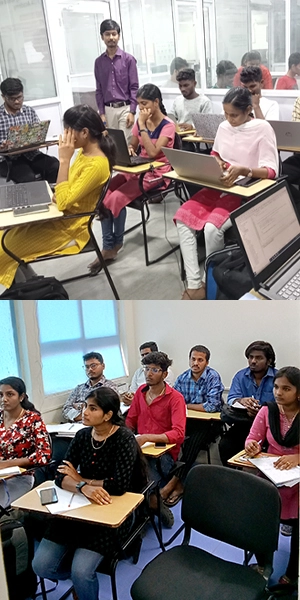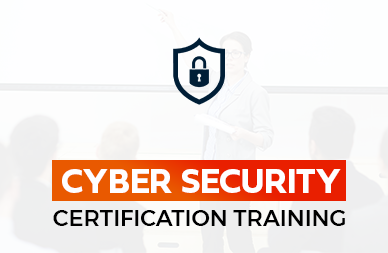FITA Academy
Empowering students across various fields, we help you enhance your skills and provide unlimited placement support until you land your dream job. Ready to learn and make an impact?
Course Highlights and Why Cyber Security Course in Chennai at FITA Academy?
Upcoming Batches
- 12-07-2025
- Weekend
- Saturday (Saturday - Sunday)
- 14-07-2025
- Weekdays
- Monday (Monday - Friday)
- 17-07-2025
- Weekdays
- Thursday(Monday - Friday)
- 19-07-2025
- Weekend
- Saturday (Saturday - Sunday)
Classroom Training
- Get trained by Industry Experts via Classroom Training at any of the FITA Academy branches near you
- Why Wait? Jump Start your Career by taking the Cyber Security Training in Chennai!
Instructor-Led Live Online Training
- Take-up Instructor-led Live Online Training. Get the Recorded Videos of each session.
- Travelling is a Constraint? Jump Start your Career by taking the Cyber Security Course Online!
Cyber Security Course Objectives
- Knowing basic cybersecurity principles including threat environments and several kinds of cyberattacks.
- Examining security systems and using best practices to protect digital data and assets.
- Learning network security ideas includes firewall setups, vulnerability analysis, and network scanning methods.
- Using honeypot technologies for improved security monitoring and intrusion detection and prevention systems (IDS/IPS).
- Using user management, access restrictions, and system hardening strategies, securing Linux and Windows’ standard operating systems.
- Learning safe communications using Public Key Infrastructure (PKI), encryption algorithms, and cryptographic procedures.
- Examining common cyber threats like malware, phishing, and social engineering while learning incident response and digital forensics.
- Using Metasploit and Kali Linux, practicing penetration testing techniques across reconnaissance, scanning, exploitation, and post-exploitation.
- Using security policies, standards, and practices to control security risks, compliance systems, and incident handling.
- Learning Web Development, web application security through architectural analysis, vulnerability assessment, safe coding standards, and security testing tools
Syllabus
Introduction to Cybersecurity
- Overview of Cybersecurity principles, threats, and attacks
- Introduction to security frameworks and best practices
- Legal and ethical considerations in Cybersecurity
- Overview of important Cybersecurity tools and resources
Networking and Network Security
- Basics of Networking
- Network protocols (TCP, UDP, ICMP, ARP) and architecture
- IP addressing and subnetting
- Packet Analysis using Wireshark
- Network scanning techniques using Nmap
- Network vulnerabilities and hardening measures
- Firewall concepts and configurations
- Intrusion Detection and Prevention Systems (IDS/IPS)
- Honeypots & Deception Technology
- Angry IP Scanner
- Colasoft Packet Builder
Operating System Security
- Overview of common operating systems (Windows and Linux)
- Important Powershell commands for Windows
- Important Linux Commands
- User and group management
- Access controls and Permission
- Securing operating system configurations
- Hardening techniques and security updates
- Malware detection and prevention strategies
- Introduction to endpoint security solutions
- Process Explorer for Windows
- TCPView for Windows
- Logger for Linux
- Grep for Linux
Web Application Security
- Web application architecture and protocols (HTTP, HTTPS)
- Common web application vulnerabilities.
- Cross-Site Scripting
- SQL Injection
- Secure coding principles and best practices
- Web application scanning and vulnerability assessment tools
- Burp Suite
- OWASP Zap
- Nessus
- Nikto
- Web application firewall (WAF) concepts and configurations
- Secure session management and authentication mechanisms
Cryptography and PKI
- Introduction to encryption algorithms and techniques
- Symmetric and asymmetric cryptography
- Public Key Infrastructure (PKI) and certificate management
- Digital signatures and secure communication protocols
- Cryptographic attacks and countermeasures
- HashCalc
- Bctextencoder
- CryptoForge
- VeraCrypt
- CrypTool
Threats and Incident Response
- Common types of cyber threats
- Malware, Phishing & Social engineering
- Incident response process and procedures
- Digital forensics fundamentals
- Incident detection & analysis
- SIEM tools - Splunk
Penetration Testing and Ethical Hacking
- Introduction to penetration testing methodologies
- Reconnaissance techniques and information gathering
- Scanning and enumeration methodologies
- Exploitation and post-exploitation techniques
- Important Penetration testing tools.
- Metasploit
- Kali Linux tools
- Wireless network security and ethical hacking techniques
Security Operations and Management
- Security policies, standards, and procedures
- HIPAA Standards
- ISO Standards
- PCI Standards
- Security risk management and assessment
- Security controls and compliance frameworks (e.g., ISO 27001, NIST)
- Security incident handling and reporting
- Security awareness and training programs
- Business Continuity (BC)
- Disaster Recovery (DR)
- Incident Response (IR)
Final Capstone Project & Resume Preparation
- Two recent Real-world scenario-based projects
- Applying the knowledge and skills gained throughout the course in a Capstone Penetration testing project
- Final presentation of project by Students
- Resume Preparation & Review with the support of Trainer
Cyber Security Course Trainer Profile
- Our trainers are certified specialists with more than ten years of expertise as security architects, cybersecurity engineers, and malware analysts, CISSP and CISA-certified professionals.
- Bringing real-world knowledge to the classroom, our trainers share case studies that enable students to grasp the ideas thoroughly.
- Through regular exercises, and conversations, they build an interactive knowledge environment that motivates student involvement.
- The trainers regularly update with the most recent advancements in their profession.
- The cybersecurity trainers guide students to work on projects, therefore equipping students with the necessary tools to ace interviews and land a job.
Learn at FITA Academy & Get Your
Dream IT Job in 60 Days
like these Successful Students!
Student Success Story of Cyber Security Course in Chennai
Fazil, a recent BSc Computer Science graduate, possessed a deep passion for computer science and IT subjects. He wanted to gain knowledge and expertise beyond his degree, so he decided to join an IT course that would enhance his skills. He was interested in learning Cyber Security, as he was eager to understand the intricacies of safeguarding data on the cloud and various devices.
With this ambition in mind, he set out to identify the Best Cyber Security Courses in Chennai. Meanwhile, he met a former college senior who had completed the Cyber Security Course at FITA Academy and was now employed as a security analyst.
Upon this meeting, Fazil reached out to FITA Academy. Our coordinators provided him with invaluable guidance to navigate the world of Cyber Security. They explained the course’s features and benefits. He enthusiastically enrolled in the course, eager to embark on his journey to becoming a Cyber Security expert.
His passion for learning were evident throughout the course. He attended the classes actively and adequately participated in practical sessions. His hard work paid off with the help of our placement support, as he not only grasped the fundamentals of the field but also developed advanced skills in Cyber Security.
Upon completing the Cyber Security Course in Chennai with certificate at FITA Academy, he attended interviews scheduled by our placement cell and got job offers from NTT Data and TCS. Finally, he had chosen a job offer from NTT Data. He landed a prestigious job as a Cyber Security analyst at NTT Data. Fazil’s ability to safeguard digital assets and protect sensitive information became a valuable asset to his employer.
Key Features
FITA Academy empowers individuals with industry-relevant skills through expert-led training, transforming careers with hands-on experience.

Expert Trainers
Learn from industry professionals with hands-on experience.

Real-Time Projects
Gain practical exposure by working on live projects.

Certification
Get certified from FITA Academy and become job-ready.

Affordable Fees
High-quality courses available at a low budget.

Flexible Learning
Choose online/classroom, timings, and learning pace.

Placement Support
Access 3000+ companies for career opportunities.
Why Learn Cyber Security Course in Chennai at FITA Academy?
Live Capstone Projects
Real time Industry Experts as Trainers
Placement Support till you get your Dream Job offer!
Free Interview Clearing Workshops
Free Resume Preparation & Aptitude Workshops

Cyber Security Certification Training in Chennai
Businesses need cybersecurity professionals to protect their networks and data from digital attackers as modern threats are rising and getting harder and tougher to handle. Thus, given our digital environment, the necessity for cybersecurity is of first importance. Through Cyber Security Certification in Chennai at FITA Academy, you can get specialized cybersecurity knowledge that opens more professional paths.
Those who complete the course get a professional certification that increases their credibility and opens better job prospects. Cybersecurity remains a top concern across all sectors, thus FITA Academy’s Cyber Security Course in Chennai helps our students earn respected credentials which lead them to many career paths in government agencies alongside multinational corporations, financial institutions and technology companies. The Cyber Security Course is the ideal learning route for cybersecurity job development at FITA Academy since the outstanding training standards couple with globally applicable certificates.
Having acquired knowledge and skills through the Cyber Security Course in Chennai at FITA Academy, you also crack other global certifications. The following describes some of these certificates:
Cyber Security Certification Examinations
- Certified Information Systems Security Professional (CISSP)
- Certified Information Systems Auditor (CISA)
- Certified Information Security Manager (CISM)
- CompTIA Security+
- Certified Ethical Hacker (CEH)
- GIAC Security Essentials Certification (GSEC)
- Systems Security Certified Practitioner (SSCP)
Have Queries?
Talk to our Career Counselor for more Guidance on picking the right Career for you!
Placement Session & Job Opportunities
After completing Cyber Security Course in Chennai
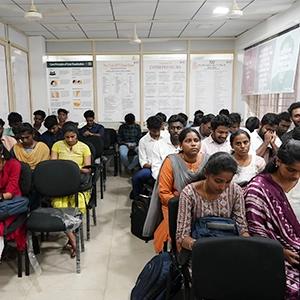


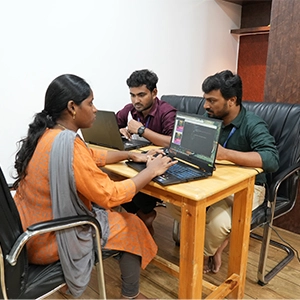
As modern threats are rising rapidly in today’s digital space, every organisation need cyber security professionals to identify attacks, effectively protect networks & data by continuous monitoring and preventative actions. There are so many roles in cybersecurity such as Penetration Tester, Security Engineer, Security Analyst, Malware Analyst, Reverse Engineer, Information Security Analyst, Network Engineer, Security Architect, and Ethical Hacker.
Especially in the government and IT industries, these experts are much sought for Cyber Security Analyst Salary for Freshers ranges between Rs. 3,70,000 and Rs. 4,80,000. Cybersecurity is a good option if your job path promises development and progress. The Cyber Security Course in Chennai with Placement from FITA Academy provides students with the necessary information and abilities to succeed in this industry. Our trainers at FITA Academy impart the required skill set essential for a competent Security Engineer.
“Students receive 100% placement support till they get their desire job.”
A candidate in the field of cyber security could be performing the following jobs and responsibilities:
Penetration Tester: Usually, a penetration tester is assigned to enter the computer networks of others to confirm the efficacy of firewalls and antivirus protections. They test these systems using viruses, Trojans, and other methods. Enrol in the Best Cyber Security Institute in Chennai to begin your career as a penetration Tester.
Malware Analyst: A malware analyst breaks into malware to find an understanding of its origins and goal. The analyst seeks to identify the channels of attack employed by the invaders. Obtaining our Cyber Security Certification in Chennai can help you become a malware analyst.
Security Analyst: Working with a network security team, the security analyst’s role is to evaluate emerging risks that may impact staff efficiency or customer confidentiality. By identifying weaknesses and recommending system and protocol enhancements, security analysts also help companies implement effective software solutions. Several of our FITA Academy graduates work for different companies and banks as security analysts in the IT support divisions.
Reverse Engineer: Reverse engineering is the study and disassembly of current systems to understand their inherent dynamics. Typically, programmers have used reverse engineering to identify security flaws in existing systems. A reverse engineer won’t change source files. Rather, by decoding proprietary file formats or dissecting executable binary instructions, they gain an understanding of the application’s functionality. Obtaining a Cyber Security Certification in Chennai at FITA Academy unlocks your career path to cybersecurity as a Reverse Engineer.
Security Architect: The person in charge of the thorough design of a secure system, including hardware and software elements, is a security architect. Architects evaluate the security policies applied in other systems, suggest improvements, and then design and build a system exactly tailored to meet those requirements. The architect must stay informed about modern developments in system security and technology. Security architects have several chances; once you get certification from the Cyber Security Training in Chennai, you can work in these areas.
Ethical Hacking: White-hat hacking, sometimes referred to as ethical hacking, is the term used often to describe someone who accesses an organization’s systems in order to gather data for analysis or assess security policies. Often, their discoveries help spread awareness of potential technological product defects. But if too much private information is stolen in an attempt to breach, their actions could lead to accusations of cybercrime. Following completion of the Cyber Security Course in Chennai, you will find plenty of employment, including ethical hacking and other cybersecurity-related positions.
Information Assurance Specialist: Though they concentrate primarily on the legal side of computer-related investigations and prosecutions, information assurance specialists carry out tasks similar to those of computer forensics specialists. If you like to work as an Information Assurance Specialist, take advantage of FITA Academy’s Cyber Security Course in Chennai, designed based on the regularly updated Cyber Security Course Syllabus.
Computer Forensic Investigator: Searching hard disks and other electronic devices, including cell phones and PDAs, computer forensics experts look for evidence of illicit conduct. If you wish to work as a computer forensic investigator. Enrol in the Cyber Security Course in Chennai, where you may learn about looking through personal gadgets and gain great information in Cyber Security. Investigating crimes against businesses, they examine business servers and other tangible assets.
Cyber Crime Investigator: After completing the Cyber Security Training in Chennai at FITA Academy, one can start a career as a cybercrime investigator, which will enable you to determine whether attackers have compromised computers to extract sensitive data, including credit card numbers and confidential information.
Rohit
I studied Cyber Security training, It was a great course where I have learned many things about the Cyber Security Domain. FITA Academy is one of the great institutions to learn this Cyber Security Course in Chennai, It is a complete and interesting course. Thanks to the trainer and FITA Academy
Paul Jackson
I completed my Cyber Security Training in Chennai, it was a great experience to learn with FITA Academy, Course and the syllabus content of Cyber Security was very excellent. The Instructor who taught me this course, helped me a lot to gain excellent knowledge, thanks to FITA Academy and the Tutor.
Yoganathan
Cyber Security is one of the excellent courses for beginners, I enrolled in this course at FITA Academy, it is the right place to start to enter the world of cybersecurity. The Context of Cybersecurity was very interesting and the instructor has taught it very clearly, Thanks to FITA Academy for giving such a great learning experience.
Manasa
I Enrolled in Cyber Security Training in Chennai, at FITA Academy, Really it is a great introduction to Cyber Security for business. I have learned all fundamentals and practical sessions with the help of an instructor. Thanks to the trainer and FITA Academy for teaching this Course very clearly.
Sharma
I have Completed my Cyber Course in Chennai at FITA Academy, This course has helped me to learn more about Information Security and in Cyber Security Domain, Thanks to the trainer and FITA Academy, for giving me such a great learning experience in Cyber Security Domain.
Our Students Work at
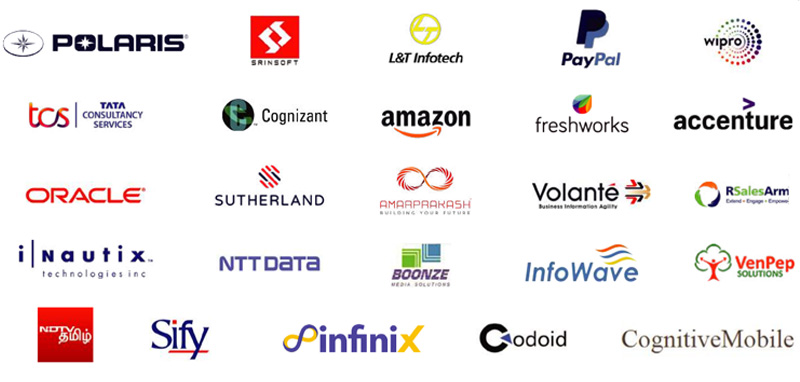
Frequently Asked Question (FAQ) about Cyber Security Course in Chennai
- The Cyber Security Course at FITA Academy is designed by industry Experts with extensive experience in the Cyber Security and Networking field.
- Comprehensive Cyber Security Training to upskill your knowledge of various Cyber Security techniques under the guidance of Real-time professionals.
- 60+ hours of Extensive coverage of the Cyber Security Course in Chennai at FITA Academy.
- More than 1,00,000+ students have received from FITA Academy.
- Cyber Security Training in Chennai at FITA Academy trains you with mock interviews and Cyber Security Interview Questions and Answers.
- Cyber Security Course in Chennai fees structure for both students and working professionals.
- Professional Cyber Security Training at FITA Academy with certification.
- We also provide Corporate Training.
- Yes, we have placements tie-ups with more than 3000+ companies that have job openings for Security engineers and related roles.
- With an active placement cell, we support the students by assisting them with resume-building and Interview Tips.
- We train the students with mock interviews and group discussions to make them face the interviews confidently.
- Since 2012, We have been empowering individuals through training and placement programs.
- We have trained more than 1,00,000 students so far.
General Q & A about Cyber Security Course in Chennai
Can I learn cyber security?
Which language is used in cyber security?
Is Cyber Security easy for beginners?
What is the average monthly income for cyber security professionals?
Is Cyber Security a promising career?
Which is the Best Institute for Cyber Security Course in Chennai?
Is Cyber Security a good option for beginners?
Which are the advanced level programs in Cyber Security?
- Cyber Security Expert.
- CEH v11 (Certified Ethical Hacker)
- CISSP (Certified Information Systems Security Professional)
- CISA (Certified Information Systems Auditors)
- CISM (Certified Information Security Manager)
- CCSP (Certified Cloud Security Professional)
Is cyber security course challenging?
Is there any exam for cyber security?
What is the first step in cyber security?
What are the 5 stages in cyber security?
- Identify
- Protect
- Detect
- Respond
- Recover
How do you succeed in Cyber Security?
Is it hard to get a job in Cyber Security?
Can a non-IT person learn Cyber Security?
Should I learn C or C++ for cyber security?
Should I learn Python or C++ for cyber security?
What is the highest salary can a cyber security professional earn in india?
